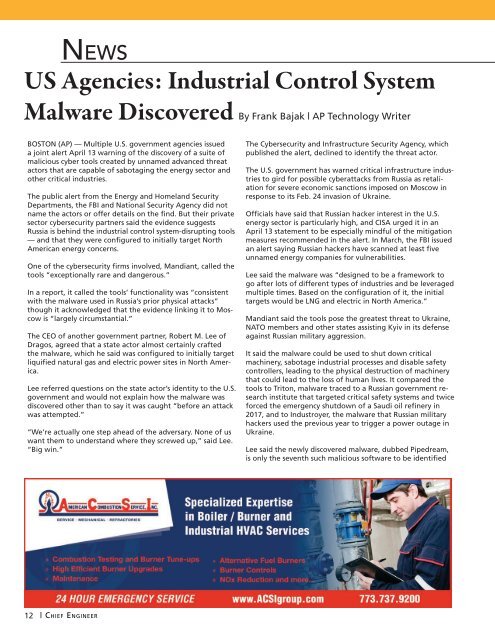CEAC-2022-05-May
You also want an ePaper? Increase the reach of your titles
YUMPU automatically turns print PDFs into web optimized ePapers that Google loves.
News<br />
US Agencies: Industrial Control System<br />
Malware Discovered By Frank Bajak | AP Technology Writer<br />
BOSTON (AP) — Multiple U.S. government agencies issued<br />
a joint alert April 13 warning of the discovery of a suite of<br />
malicious cyber tools created by unnamed advanced threat<br />
actors that are capable of sabotaging the energy sector and<br />
other critical industries.<br />
The public alert from the Energy and Homeland Security<br />
Departments, the FBI and National Security Agency did not<br />
name the actors or offer details on the find. But their private<br />
sector cybersecurity partners said the evidence suggests<br />
Russia is behind the industrial control system-disrupting tools<br />
— and that they were configured to initially target North<br />
American energy concerns.<br />
One of the cybersecurity firms involved, Mandiant, called the<br />
tools “exceptionally rare and dangerous.”<br />
In a report, it called the tools’ functionality was “consistent<br />
with the malware used in Russia’s prior physical attacks”<br />
though it acknowledged that the evidence linking it to Moscow<br />
is “largely circumstantial.”<br />
The CEO of another government partner, Robert M. Lee of<br />
Dragos, agreed that a state actor almost certainly crafted<br />
the malware, which he said was configured to initially target<br />
liquified natural gas and electric power sites in North America.<br />
Lee referred questions on the state actor’s identity to the U.S.<br />
government and would not explain how the malware was<br />
discovered other than to say it was caught “before an attack<br />
was attempted.”<br />
“We’re actually one step ahead of the adversary. None of us<br />
want them to understand where they screwed up,” said Lee.<br />
“Big win.”<br />
The Cybersecurity and Infrastructure Security Agency, which<br />
published the alert, declined to identify the threat actor.<br />
The U.S. government has warned critical infrastructure industries<br />
to gird for possible cyberattacks from Russia as retaliation<br />
for severe economic sanctions imposed on Moscow in<br />
response to its Feb. 24 invasion of Ukraine.<br />
Officials have said that Russian hacker interest in the U.S.<br />
energy sector is particularly high, and CISA urged it in an<br />
April 13 statement to be especially mindful of the mitigation<br />
measures recommended in the alert. In March, the FBI issued<br />
an alert saying Russian hackers have scanned at least five<br />
unnamed energy companies for vulnerabilities.<br />
Lee said the malware was “designed to be a framework to<br />
go after lots of different types of industries and be leveraged<br />
multiple times. Based on the configuration of it, the initial<br />
targets would be LNG and electric in North America.”<br />
Mandiant said the tools pose the greatest threat to Ukraine,<br />
NATO members and other states assisting Kyiv in its defense<br />
against Russian military aggression.<br />
It said the malware could be used to shut down critical<br />
machinery, sabotage industrial processes and disable safety<br />
controllers, leading to the physical destruction of machinery<br />
that could lead to the loss of human lives. It compared the<br />
tools to Triton, malware traced to a Russian government research<br />
institute that targeted critical safety systems and twice<br />
forced the emergency shutdown of a Saudi oil refinery in<br />
2017, and to Industroyer, the malware that Russian military<br />
hackers used the previous year to trigger a power outage in<br />
Ukraine.<br />
Lee said the newly discovered malware, dubbed Pipedream,<br />
is only the seventh such malicious software to be identified<br />
12<br />
| Chief Engineer


















